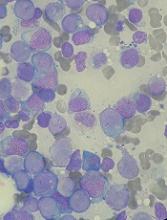The US Food and Drug Administration (FDA) has granted orphan drug designation to PCM-075 for the treatment of patients with acute myeloid leukemia (AML).
PCM-075 is an oral adenosine triphosphate competitive inhibitor of the serine/threonine Polo-like kinase 1 (PLK1) enzyme, which appears to be overexpressed in several hematologic and solid tumor malignancies.
PCM-075 is being developed by Trovagene, Inc.
The company is initiating a phase 1b/2 trial of PCM-075 in combination with standard care (low-dose cytarabine or decitabine) in patients with AML (NCT03303339).
Trovagene has already completed a phase 1 dose-escalation study of PCM-075 in patients with advanced metastatic solid tumor malignancies. This study was recently published in Investigational New Drugs.
According to Trovagene, preclinical studies have shown that PCM-075 synergizes with more than 10 drugs used to treat hematologic and solid tumor malignancies, including FLT3 and HDAC inhibitors, taxanes, and cytotoxins.
Trovagene believes the combination of PCM-075 with other compounds has the potential for improved clinical efficacy in AML, non-Hodgkin lymphoma, castration-resistant prostate cancer, triple-negative breast cancer, and adrenocortical carcinoma.
About orphan designation
The FDA grants orphan designation to products intended to treat, diagnose, or prevent diseases/disorders that affect fewer than 200,000 people in the US.
The designation provides incentives for sponsors to develop products for rare diseases. This may include tax credits toward the cost of clinical trials, prescription drug user fee waivers, and 7 years of market exclusivity if the product is approved.


